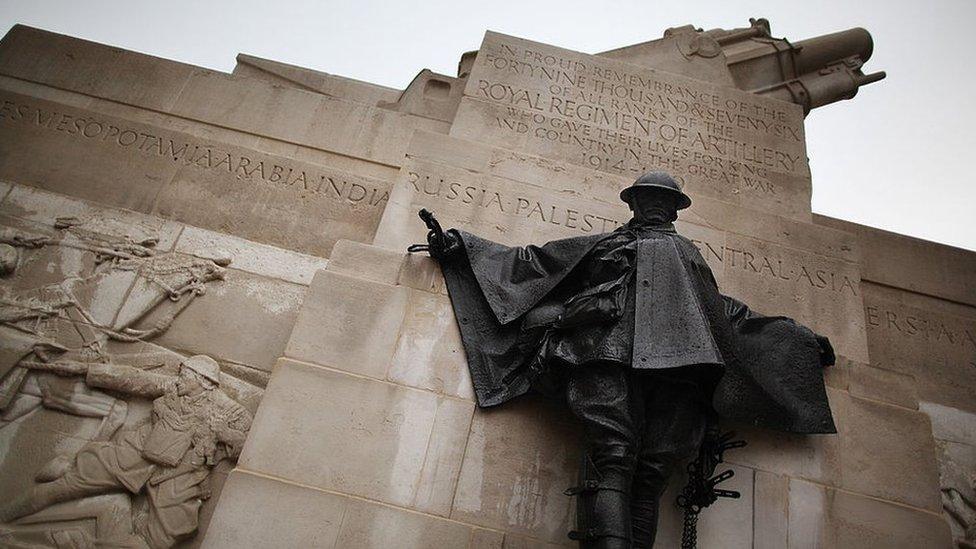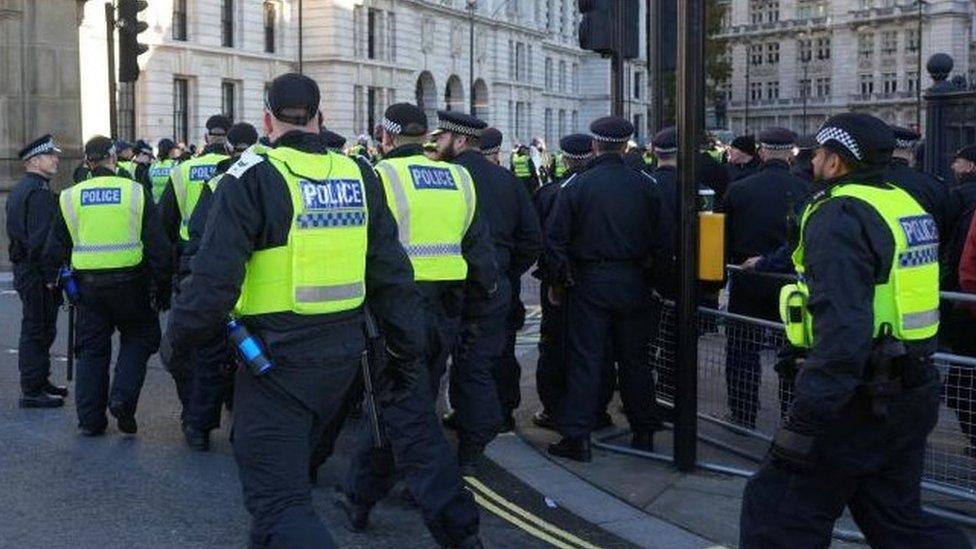More powers to protect war memorials from protesters considered
- Published

The government is considering whether police need new powers to stop protesters climbing war memorials.
A breakaway group of pro-Palestinian demonstrators scaled the Royal Artillery Memorial in London's Hyde Park Corner on Wednesday night.
Met Police Commissioner Sir Mark Rowley said their actions were "inflammatory" but did not break any laws.
No 10 said it was an "affront" and that it would look at further measures so officers could take action in future.
"We will look at what further measures are needed so that the police can have confidence in taking action on this," the prime minister's official spokesman said on Thursday.
"We do believe there are extensive powers available to them but the public will have been shocked and I'm sure appalled by what they saw."
Protesters calling for a ceasefire in the Israel-Gaza conflict marched outside the Houses of Parliament on Wednesday night.
A group of pro-Palestinian demonstrators were filmed climbing up the Hyde Park Corner monument, which was built to commemorate the thousands of soldiers from the Royal Artillery who were killed in World War One.
In a statement, the Met said officers were on the scene quickly but "not quickly enough to prevent the protesters accessing the memorial".
Met chief Sir Mark said his officers recognised the behaviour to be "unfortunate" and "inflammatory in certain ways", but not illegal.
Speaking at an Institute for Government event on Thursday, he said it was for the government to consider whether officers should be given further powers to respond to protests.
Asked about the police response to the incident, he said: "What the officer didn't do last night was make up a law that it's illegal to do something and do an arrest which would have been illegal, clearly.
"The officers intervened, as officers often are doing, to try and de-escalate risk of conflict, even when there isn't explicit power to do it."
Sir Mark refused to be drawn on an article in the Times newspaper written by former Home Secretary Suella Braverman, external, in which she accused officers of "playing favourites" when policing protests.
In her article, Mrs Braverman accused Met Police of applying a "double standard" to its policing of recent pro-Palestinian protests.
She claimed aggressive right-wing protesters were "rightly met with a stern response", while "pro-Palestinian mobs" were "largely ignored".
James Cleverly, who replaced Mrs Braverman as home secretary, said he would be examining whether the police needed new powers following Wednesday's protest.
"These - and the police have said this - are deeply disrespectful actions," he told ITV's Good Morning Britain on Thursday.
"The war memorials recognise the sacrifice people have made for our freedom, and abusing, desecrating behaviour like this is deeply, deeply offensive.
"I will look at what further measures need to be taken so the police can take action on this."
Other measures intended to strengthen police powers to deal with protesters are also reportedly being considered by the government, including lowering the threshold for when police could apply for a ban to stop marches taking place.
Protests have been taking place in London and across the UK to call for a ceasefire in Gaza.
Israel began air strikes on Gaza following Hamas's attacks on 7 October, in which 1,200 were killed and more than 200 hostages were taken.
The Hamas-run health ministry says more than 11,500 people have been killed in Gaza since then.
- Published13 November 2023
